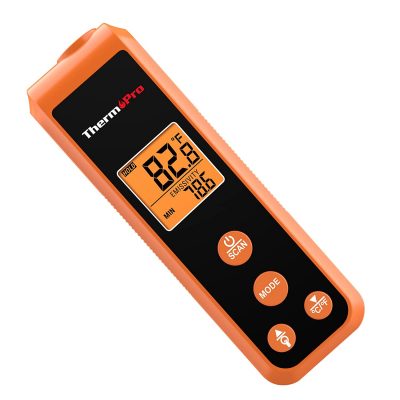The customer service team is always listening, taking notes, and quantifying complaints to ensure our products are continually improved. Due to selling directly to you, the customer, via Amazon, we can use product reviews to help us improve our existing products or help further development of new products.
The Smoke Point: What Home Chefs Need to Know
Cooking thermometers are very important tools for the kitchen. With these handy and affordable tools, home chefs can achieve great results.
Instead of using time or appearance to judge when food is ready, meat thermometers allow users to cook according to internal temperatures. As a common practice for high-end eateries, this scientific method allows users to create restaurant-quality food in their own homes.
While this is commonly known by the public, there is also another way thermometers can help out in the kitchen. This has to do with the smoke point of oil.
What is the smoke point of oil?
When cooking with oil, you’ve likely noticed that its form changes throughout the cooking process.
In the beginning, cooking oil is viscous and thick, taking its time to pour out of the bottle. After heating up a bit, the oil becomes thinner and will run around your pan more easily; you may notice it to have a slight shimmering effect. And if you turn up the heat high enough, the oil will finally begin to emit smoke. This is the “smoke point” of oil.
What’s so important about the smoke point of oil?
When cooking oil reaches its smoke point, it hits a point of no return. The oil begins to alter its chemical composition that breaks down its molecular composition. Not only is its flavor irrevocably changed, but its nutritional benefits are lost as well. Along with emitting a burnt flavor, overheated natural fats in the super-heated oil may begin to release harmful free radicals that may cause damage to your cells.
READ: How to Use an Infrared Thermometer Gun for Grilling & Cooking
At what temperature does the smoke point of oil occur?
The smoke point of oil is different for every different type of cooking oil. A main rule of thumb is that more highly refined cooking oil tend to have higher smoke points. This will offer more versatility by allowing you to cook at a higher temperature. Generally, the smoke point will occur between 250°F and 500°F (121°C-260°C).

What are the smoking points for some well-known oils?
- Canola oil 400-475°F
- Soybean oil 450°F
- Sunflower oil (refined) 450°F
- Sesame oil (refined) 410°F
- Extra virgin olive oil (unrefined) 325-400°F
- Vegetable oil 400°F
LOW (gentle sauteing)
- Sesame oil (unrefined) 350
- Sunflower oil (unrefined) 320°F
- Peanut oil (unrefined) 320°F
Meanwhile, some unrefined oils are best used away from the stove. Flaxseed and wheat germ are better used as ingredients in smoothies and salad dressings instead of oil for cooking.
In some cases, the smoking point of oil is not significant for certain types of cooking. It is a normal occurrence when stir-frying, for example. However, to get the best results, you need to be mindful of your temperatures in order not to exceed this limit.
READ: Temperature Gun: The Top 10 Reasons Your Home Needs It
How can I monitor the smoking point of cooking oil?
The important thing to remember with smoke points is that if you already see smoke, it’s already too late. Instead, you need a way to monitor temperatures throughout the cooking process.
The best tool for this job is a thermometer, but not like the probe thermometers mentioned before. A TP511 candy-making thermometer is well-equipped to perform the task, but its long probe is better suited for deep pots of oil or boiling sugar. Instead, the best recommendation is the practical and precise TP410.
The TP410 is an infrared thermometer gun that allows users to take contact-free temperature measurements. It features a small size that makes it compact and convenient to use. In addition to measuring cooking oil temperatures and monitoring for smoke points, the TP410 can also perform these other cooking tasks:
- Measuring pizza stones: Tells you when it has arrived at an ideal 485°F
- Measuring BBQ grates: Warm up the grill before adding your meat
- Measuring soup other heated liquids: Be sure to stir thoroughly before using
How do I use a thermometer gun to measure cooking oil temperature?
Final Thoughts
Dealing with smoke points doesn’t have to be a hassle. Use an IR thermometer like the TP410 to take accurate and quick results. By staying below the smoke point of your cooking oil, you’ll enjoy healthy eating and avoid offensive flavors in your food.
Are you interested in other temperature guns? Browse the full lineup of ThermoPro infrared thermometers on our Amazon store!








